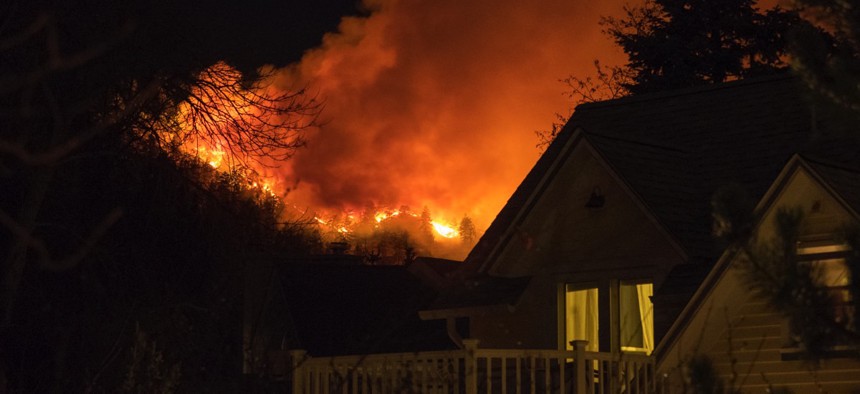Connecting state and local government leaders
Increasingly, wildfires are being blamed on human activity. And Boulder lucked out, this time.
BOULDER, Colo. — Coloradans knew it was coming, not specifically the Sunshine Canyon fire that ignited outside of Boulder on early Sunday morning, but one very much like it. They knew a wildfire would ignite and spread in the mountain forest just beyond a Colorado town and throw plumes of dark smoke into the sky and bring acrid fumes into backyards and city streets. They knew it might be as soon as the middle of March.
On Sunday in Steamboat Springs, the world-famous snow was slush at 10,000 feet near the top of the ski resort mountains, where the U.S. Championship freestyle competitions are scheduled to be held next week.
Along Front Range of the Rocky Mountains in Boulder, the historic average March temperature is 56 degrees and the average rainfall for the month is 2.19 inches. On Sunday, it was 78 degrees in Boulder, a record high. The day before, it was 79 degrees. The city so far has notched 0.05 inches of precipitation this month.
City residents who were up in the early hours of Sunday watching Twitter got their first warning at 3:39 a.m., when the Boulder County Sheriff’s office began sending out messages about the fire and planned evacuations, which included an area to the west of downtown, which is nestled in the foothills. The city’s Office of Emergency Management began posting updates at its website an hour later.
By the end of Monday afternoon, the blaze was 100 percent contained. More than 420 homes had been evacuated.
Boulder lucked out—this time. Predicted high winds and hot weather failed to materialize in a way that would have spread the flames over the perimeter dug by firefighters and handcrews.
As of Monday at noon, the fire had burned 76 acres in an area just west of town, where transient camps are popular. Authorities believe humans started the fire, whether carelessly or intentionally. Some 250 firefighters battled the blaze, and that might not have been enough.
According to the Daily Camera, Cmdr. Mike Wagner of the Boulder County Sheriff's Office noted that because March is outside the typical fire season, there were fewer wildfire handcrews available, so “firefighters were being taken off trucks” to dig fire lines.
The details of the fire tell the real story for being so typical: the unseasonable high temperatures, the forestland abutting living space, the stretched resources, the outdated “fire season” designation, the human spark somewhere that likely set the blaze.
Already strained state and local budgets haven’t kept pace with the new realities of wildfires in the Colorado and across the West. The years 2012 and 2013 broke records for destructive fires in the state. The blazes seemed to come in a steady stream, blown by high winds and fueled by forests of trees killed by the pine bark beetle infestation brought by the warm temperatures. The fires forced evacuations, engulfed homes, and frustrated desperate officials.
“Our May to October fire season is a thing of the past,” argued firefighters who traveled to the State Capitol in Denver in January to lobby state officials, including Gov. John Hickenlooper. They asked that officials embrace the new reality and take steps to address it. The firefighters, members of the “Unacceptable Risk” group, see federal plans to shrink agency budgets as potentially devastating. The Trump administration’s announced federal hiring freeze came at the same time agencies such as the U.S. Forest Service, National Park Service and Bureau of Land Management were preparing to hire seasonal employees, including firefighting handcrews.
Now seems as bad a time to be turning away from diligently managing public lands. The cost of fighting wildfires in the country is soaring. In recent years, it has exceeded $2 billion.
In Colorado, Hickenlooper’s administration has tried to keep pace. He has overseen plans that grouped all of the various wildfire emergency responses under the Department of Safety, bought two new planes and four helicopters, launched a $600,000 wildfire detection system and assembled task forces to study wildfire insurance and forest health.
There is more to do.
In February, a team of University of Colorado, Boulder, researchers published a report based on U.S. government wildfire records spanning two decades, from 1992 to 2012.
A top finding was that people are igniting an increasing number of wildfires, which has helped expand fire seasons to devastating effect.
“Human-ignited wildfires accounted for 84 percent of 1.5 million total wildfires studied, with lightning-ignited fires accounting for the rest,” according to the report. “In Colorado, 30 percent of wildfires were started by people, burning over 1.2 million acres. The fire season length for human-started fires was 50 days longer than the lightning-started fire season (93 days compared to 43 days), a twofold increase.”
The silver lining in the data is that dangerous human behaviors can be modified.
“We need to focus on living more sustainably with fire by shifting the human contribution to ignitions to more controlled, well-managed burns,” said Jennifer Balch, director of University of Colorado, Boulder’s Earth Lab and the lead author of the study.
John Tomasic is a journalist who lives in Boulder, Colorado.

NEXT STORY: GOP Health Bill Amendments Allow for More State Flexibility. Is It Enough?



